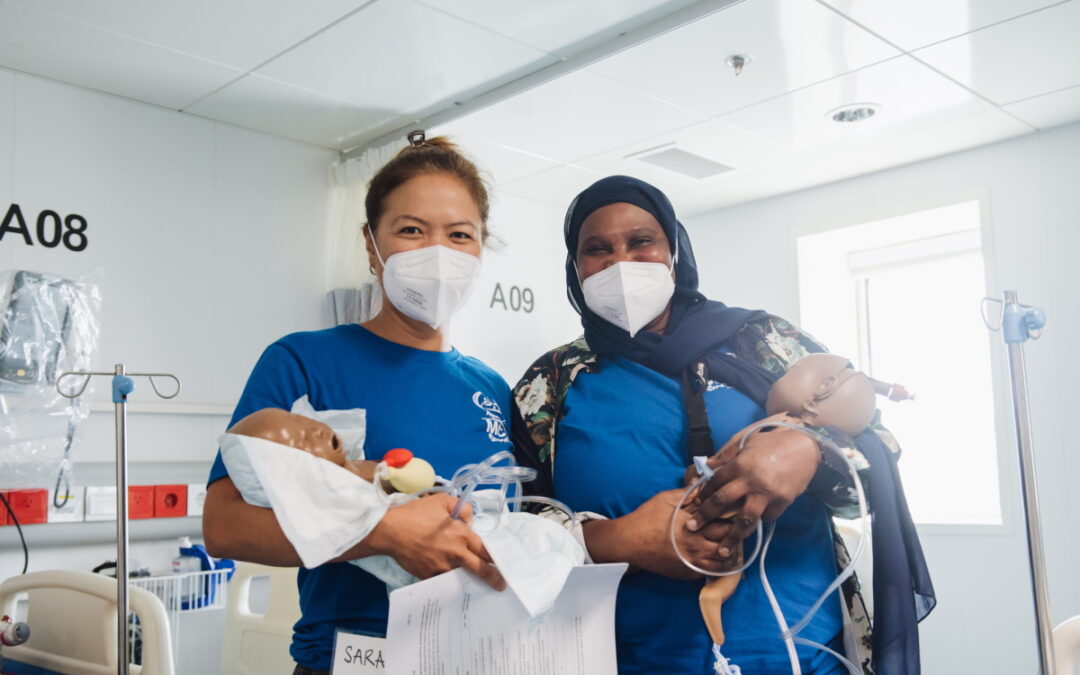Paediatric Anaesthesia Training in Senegal
In June 2022, more than 30 Senegalese healthcare professionals boarded the Global Mercy to equip themselves with new skills in safe surgery that could save countless vulnerable young lives.
“People think babies and children are just miniature adults, but actually, they have their own set of problems that are unique,” said Mercy Ships volunteer anaesthesiologist Dr. Sarah Kwok.
Researchers estimate that 85% of children in low-income countries will require surgery before their 15th birthday. Many inadequately trained anaesthesia providers are hesitant to treat children. And some anaesthesiologists in the sub-Saharan region of Africa say that they don’t have the resources to provide basic anaesthesia for a child under 5 years old.
“There are so many children in sub-Saharan Africa. Up to 50% of the population are under the age of 15 years,” Dr. Kwok said. “So, it’s really important that people are equipped and trained to deal with these unique situations and paediatric emergencies.”
That’s where the SAFE Paediatric Anaesthesia course comes in. Delivered through the Mercy Ships Medical Capacity Building program and led by Dr. Kwok, this course and several others throughout the month of June marked the first time the fleet’s newest hospital ship lowered her gangway to operate as a floating training centre.
“It’s going to be the beginning of something really exciting,” said Dr. Kwok.
The four-week training series was supported by the government of Senegal, as part of a larger effort by African nations to examine and strengthen local surgical, obstetric, and anaesthetic systems. With the recent commitment to the historic Dakar Declaration, several nations are forging ahead with making key improvements by 2030.
Exponential Impact
Since leaving her home in England to volunteer with Mercy Ships in 2019, Dr. Kwok’s primary role has been Anaesthesia Supervisor. In that position, she serves patients directly on the organisation’s other hospital ship, the Africa Mercy®. But the work she does training local doctors and nurses has a wider impact that reverberates in the long term.
By the time a Medical Capacity Building course is complete, some of the students have been trained to become trainers themselves. That means they’re certified to administer the course at their own hospitals, exponentially increasing the impact and the reach of the training.
The SAFE Paediatric Anaesthesia course covers the delivery of anaesthesia, complications, pain management, trauma, specialised care of sick children, and new born resuscitation.
“A lot of what we teach is also about the environment, and it’s about human factors and safe practice,” said Dr. Kwok. “I can’t wait to see the impact.”
SAFE Paediatric Anaesthesia uses the Safer Anaesthesia from Education (SAFE) approach developed by the World Federation of Societies of Anaesthesiologists and by the Association of Anaesthetists of Great Britain and Ireland. SAFE courses have been taught in 43 different countries.
“The great thing about SAFE is it uses many different teaching modalities in order to impart knowledge and skills, so we do things by lectures, and also with scenarios and simulation, as well as teaching skills,” said Dr. Kwok. “The combination of all these things is, it imparts more information at the time of delivery.”
Just the Beginning
Dr. Kwok has now returned to her daily role on board the Africa Mercy in the Port of Dakar. Meanwhile, the Global Mercy is undergoing maintenance in the Canary Islands before returning to Senegal in early 2023 for her first full field service. This will be her first time operating on patients, but Medical Capacity Building will continue to be one of the ship’s core missions.
Together with Senegalese healthcare professionals, partners, and supporters from around the world, training programs like Paediatric Anaesthesia have the potential to make life-changing and lifesaving care accessible to more people than ever. But the journey to safe surgery is just beginning.

Recent Comments